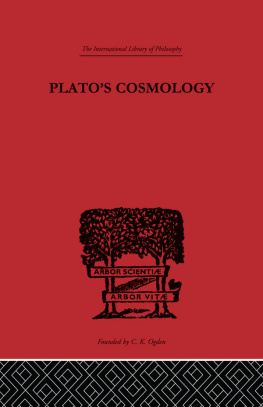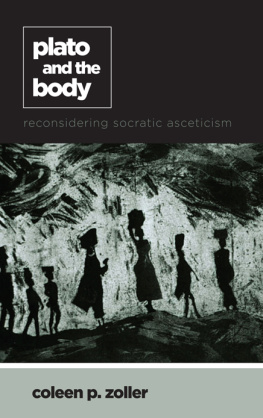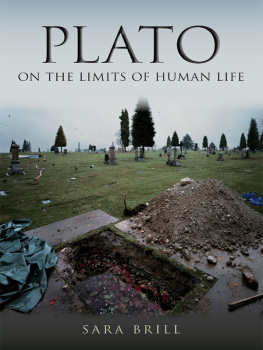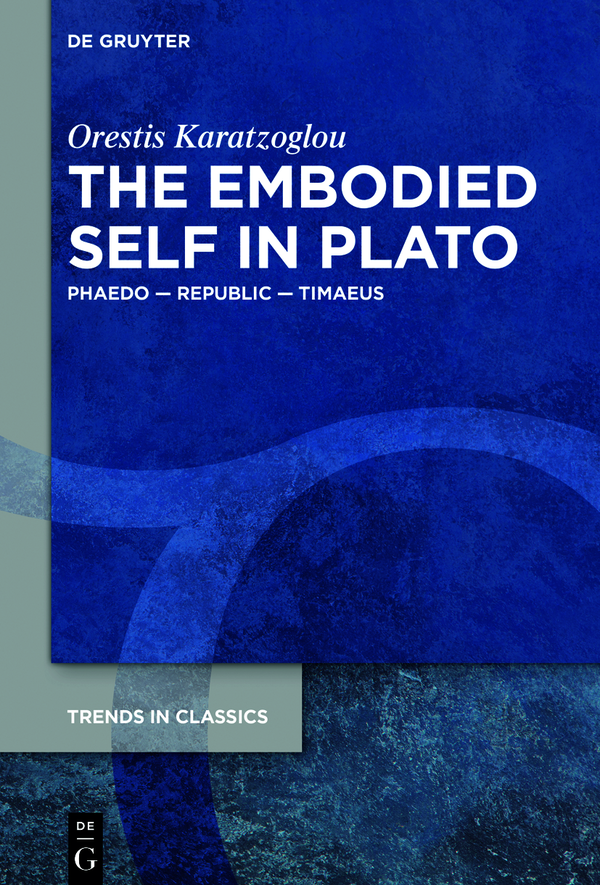Trends in Classics - Supplementary Volumes
Edited by
Franco Montanari
Antonios Rengakos
Volume
ISBN 9783110737400
e-ISBN (PDF) 9783110732450
e-ISBN (EPUB) 9783110732498
Bibliographic information published by the Deutsche Nationalbibliothek
The Deutsche Nationalbibliothek lists this publication in the Deutsche Nationalbibliografie; detailed bibliographic data are available on the Internet at http://dnb.dnb.de.
2021 Walter de Gruyter GmbH, Berlin/Boston
Orestis Karatzoglou
The Embodied Self in Plato
Trends in Classics Supplementary Volumes
Edited by
Franco Montanari and Antonios Rengakos
Associate Editors
Stavros Frangoulidis Fausto Montana Lara Pagani
Serena Perrone Evina Sistakou Christos Tsagalis
Scientific Committee
Alberto Bernab Margarethe Billerbeck
Claude Calame Jonas Grethlein Philip R. Hardie
Stephen J. Harrison Stephen Hinds Richard Hunter
Christina Kraus Giuseppe Mastromarco
Gregory Nagy Theodore D. Papanghelis
Giusto Picone Alessandro Schiesaro
Tim Whitmarsh Bernhard Zimmermann
Volume 120
Orestis Karatzoglou
The Embodied Self in Plato
Phaedo Republic Timaeus
De Gruyter
ISBN 978-3-11-073740-0
e-ISBN (PDF) 978-3-11-073245-0
e-ISBN (EPUB) 978-3-11-073249-8
ISSN 1868-4785
Library of Congress Control Number: 2021931832
Bibliographic information published by the Deutsche Nationalbibliothek
The Deutsche Nationalbibliothek lists this publication in the Deutsche Nationalbibliografie;
detailed bibliographic data are available on the Internet at http://dnb.dnb.de.
2021 Walter de Gruyter GmbH, Berlin/Boston
Editorial Office: Alessia Ferreccio and Katerina Zianna
Logo: Christopher Schneider, Laufen
www.degruyter.com
To the memory of Paraskevi Kotzia
Acknowledgements
This book is a revised version of my doctoral dissertation presented in November 2018 at the University of Illinois at Urbana-Champaign. I am grateful to Kirk Sanders who supervised the dissertation and provided valuable feedback at the early stages of the argument. I would also like to extend my gratitude to the members of my committee: Antony Augoustakis who facilitated my research by securing for me an assistantship that allowed my extended stay in Berlin; Angeliki Tzanetou for her precious assistance in clarifying certain ambiguities that arose in the Daniel W. Leon who read and commented meticulously on the entire manuscript. Special thanks is owed to Konstantinos Arampapaslis, Leon Wash and Georgia Sermamoglou-Soulmaidi for providing feedback on various drafts. My thanks also go to the faculty members of Aristotle University Yannis Tzifopoulos and Stavros Frangoulidis who encouraged me to further pursue my studies. A special mention is reserved for Theokritos Kouremenos and Poulheria Kyriakou who provided their unceasing support and valuable advice during my undergraduate years in Thessaloniki and the graduate years in the USA. Last but not least, I would like to thank the editors for accepting my manuscript for publication in the Trends in Classics series.
Orestis Karatzoglou
Thessaloniki, November 2020
Introduction
It is standard Platonic doctrine that soul and body are distinct and that, in ideal conditions, the former should hold sway over the latter. Indeed, several dialogues canvass the view that the soul reaches its purity only when it is itself by itself, a condition that allows it to commune with the unalterable entities of the Platonic realm, namely the Forms. Such remarks, dispersed throughout the corpus, have given rise to the doctrinemostly assumed rather than argued forthat Plato conceives of the self in non-physical terms and that he identifies the true self with the soul. However, extracting solely this conception of the self from Platos dialogues rests on a rather one-sided approach that turns a blind eye to textual evidence that shows awareness of different conceptions of the self, conceptions that clash with standard interpretation. In this book, I focus on these rather neglected aspects of personhood and selfhood in three of Platos dialogues, namely the Phaedo, the Republic, and the Timaeus. Given that any discussion about the nature of the self in Plato has to tackle the critical issues broached by modern theories of personal identity, I thought it apposite to briefly sketch out the state of the question in order to better illustrate the framework in which I expound my analysis. The purpose of the introduction is to provide an overview of the various existing conceptions of selfhood and to situate the present study within Platonic scholarship.
Varieties of Self
Issues concerning the existence as well as the nature of selfhood have not ceased to spark philosophical debate in modern times. Approaches vary from outright denial to affirmative defense of its existence, whereas the entire gamut of possible reactions to the problem is available both in continental and analytic philosophy.
In spite of the different aims that inform the definitions offered by each philosopher, there is common ground to be found in their conceptions of the self, namely their reluctance to admit that the body might have some role in the constitution of the self and the concomitant insistence on dislodging it from the selfs essence. Following a line of reasoning closely resembling that of Augustines cogito arguments (Trin. 10.10.16), Descartes concludes that his essence is exhausted in his being a thinking non-extended thing from the fact that he has a clear and distinct idea of himself as a thinking non-extended thing; he considers the body as peripheral toand detachable fromhis core self on account of the fact that he has a clear and distinct idea of it as an extended non-thinking thing.
The thinkers examined above jettison the body from the notions of selfhood and personhood, driving thereby a wedge between these concepts and that of human identity. The twin ideas that humans are only potentially persons and that persons are not necessarily humans are very much alive in modern philosophical literature.
Platos Incompatible Selves
Granted that Plato would never have cast any discussion about these notions in modern terminology, it still remains an indisputable fact that there is substantial attempt to cultivate oneself, several passages throughout the corpus imply various conceptions of selfhood which conflict with one another. In this section, I briefly examine the notions of selfhood and personhood found in the Theaetetus, the Alcibiades I, the Laws, and the Symposium. My analysis reveals that these dialogues include at least two conceptions of selfhood that are so divergent as to be irreconcilable.
In the Theaetetus, for example, Socrates advances a conception of the self that resembles the so-called bundle theory, according to which there is nothing over and above the bundle of individual features: the self just is their sum.
Whereas Socrates rebuttal of the bundle theory and his endorsement of the view that experience must be unified invoke the familiar doctrine that the self is essentially the soul, the idea should be resisted that the entire Platonic corpus heralds such a uniform notion of selfhood. Indeed, both the Alcibiades I and the she develops an account according to which each and every animal is said to be one and the same, even though every part of its body is constantly renewed (207d2e1). The same thing, Diotima goes on, applies equally to matters of the soul: all the constituents of inner life (customs, opinions, desires, pleasures, pains, fears) are subject to continuous alteration (207e15). Even knowledge cannot secure identity, for it is always replenished as the very nature of learning suggests: pieces of knowledge that slip from memory are constantly replaced with new ones through study (207e1208a7). Given that the identification of the self with the soul is buttressed by the implicit conviction that mental entities are unalterable, Diotimas account of inner events as susceptible to change renders untenable the assumption that a doctrine about the self operates univocally throughout Platos works.










